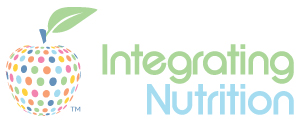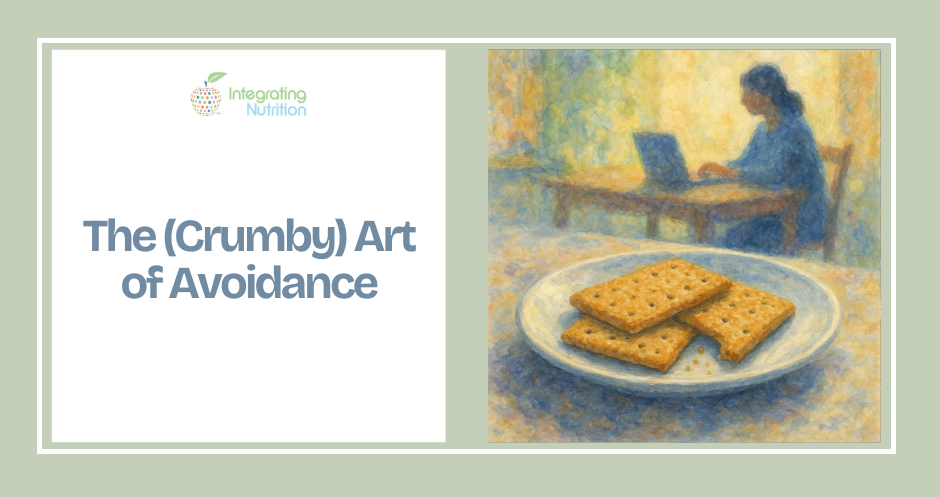The other day, I caught myself doing something I make my clients aware of. I was standing next to the sink eating a few whole-grain crackers even though I wasn’t hungry. (I rationalized that that was okay because at least the crackers were higher in fiber.) It took me a moment to realize that I actually wasn’t even particularly interested in the food.
I was interested in the delay.
In Why Did I Just Eat That? I describe this common behavior as Procrastin-Eating. That’s a fun way to describe a serious issue: when we use food to put off doing something we don’t want to do. It could be avoiding an unpleasant task such as paying bills. It could also be a way of avoiding something that we actually want to do but are intimidated by, like starting a project that actually matters to us. (Writing blog posts, for example.) Either way, eating becomes a kind of emotional side-street; a handy stall. If this behavior is indulged in habitually, it can be identified as a familiar emotional pattern, what psychologists might call avoidance behavior.
When we feel unsure, overwhelmed, or afraid of failing, our uncomfortable brains look for relief. Food is a convenient and reliable way to deliver that relief instantly. It engages our senses, it can be emotionally soothing, and our response to food is predictable and comfortable. For a moment, at least, it quiets the discomfort of starting something uncertain; a compelling distraction that also gives us the illusion of control.
That’s what makes procrastin-eating such a sticky habit to fall into. It’s not about hunger or self-care. It’s about managing the conflict between generating the energy to tackle a challenge while at the same time not wanting to feel the anxiety that comes along with it.
Turning the Moment Into Awareness
When I noticed what I was doing, I didn’t make myself wrong. I just owned what I was doing. I said to myself, silently: Ok. I acknowledge that I’m using food to avoid something I don’t feel like doing.
That simple act of mindful self-talk shifted everything. I told myself that the crackers tasted good and I could enjoy them later… when I was actually hungry. And then I went to my desk and picked up the work I had been avoiding.
Mindfulness is about connecting with what’s really happening in the moment. When we slow down enough to name what we’re doing, it becomes likelier for the action will lose its grip. Awareness interrupts the autopilot pattern of automatic eating.
Why Procrastin-Eating Isn’t A Character Flaw
It’s tempting to frame this behavior as a lack of discipline — If I just tried harder, I wouldn’t snack so much, but that’s not quite right. The truth is, procrastin-eating can be about fear: fear of imperfection, fear of effort that might not pay off, fear of exposure, fear of the unknown.
Some people use food to soothe the pressure of perfectionism, while others feel somewhat paralyzed by not knowing where to start. Still others need the rush of a looming deadline to finally engage, and for them, hanging around and eating is a way to kill time before feelings of urgency arrives.
If you see yourself in that description, you’re not alone. Most of us do this to some extent, at least occasionally.
The Takeaway
If you find yourself eating when you’re not hungry, pause and ask yourself, “What am I getting out of eating right now? Am I trying to avoid something?” Very often, just being aware of what is going on with us helps steer us toward behavior that serves our highest good. Still, whether or not we are able to make immediate adjustments for the better, we should always treat ourselves with kindness… as we untangle old habits, striving toward more beneficial ones.





